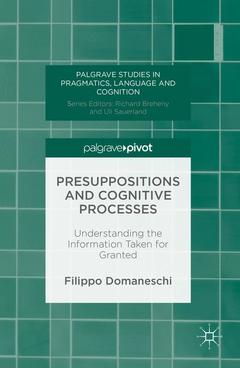Description
Presuppositions and Cognitive Processes, 1st ed. 2016
Understanding the Information Taken for Granted
Palgrave Studies in Pragmatics, Language and Cognition Series
Author: Domaneschi Filippo
Language: English
Subjects for Presuppositions and Cognitive Processes:
Publication date: 07-2016
Support: Print on demand
Support: Print on demand
Description
/li>Contents
/li>Biography
/li>Comment
/li>
This book breaks new ground towards an understanding of the mental processes involved in presupposition, the comprehension of information taken for granted. Various psycholinguistic experiments are discussed to support the idea that involved in ordinary language comprehension are complex and demanding cognitive processes. The author demonstrates that these processes exist not only at the explicit level of an utterance but also at a deeper level of computing, where the background information taken for granted as already known and shared between interlocutors is processed. The author shows that experimental research can suggest new theoretical models for presupposition, thus this book will be of interest to researchers and students of psycholinguistics, the philosophy of language and experimental pragmatics.
Introduction.- Chapter 1: Experimental Pragmatics.- Chapter 2: Presuppositions.- Chapter 3: Mental States and Presuppositions. An Experiment.- Chapter 4: Processing Presupposition Triggers.- Chapter 5: Processing Conditional and Unconditional Presuppositions.- Chapter 6: The Cognitive Load Factor.- Chapter 7: Conclusions.
Filippo Domaneschi is Lecturer and Researcher in Psychology of Language at the University of Genoa, Italy and he is director of the research project EXPRESS – Experimenting on presuppositions. He is author of various psycholinguistic papers in scientific journals, and he is author of Introduction to pragmatics (2014, tr. engl.), co-editor of What is said and what is not (2013) and editor of the special issue Presuppositions: philosophy, linguistics and psychology (2016).
Demonstrates that experimental research can suggest new theoretical models for presupposition Posits that presupposition itself is a real, specific phenomenon, not to be reduced to other kinds of implicit meaning Investigates the cognitive processes involved in processing presuppositions
© 2024 LAVOISIER S.A.S.
These books may interest you

The Oxford Handbook of Pragmatics 152.43 €



